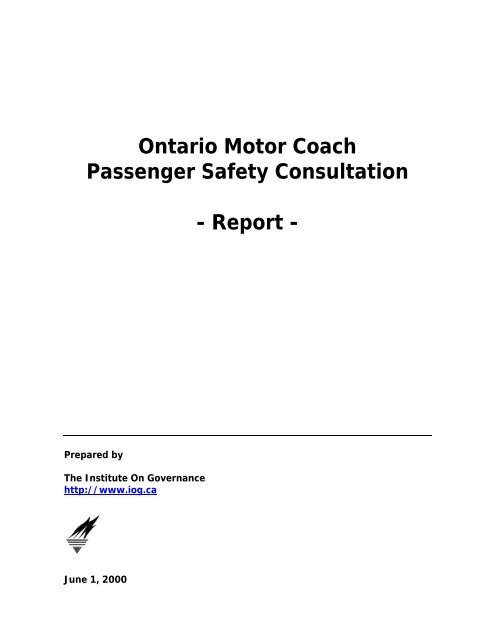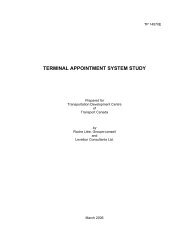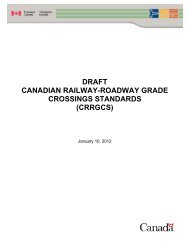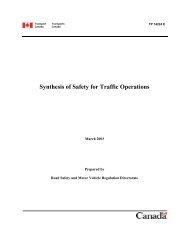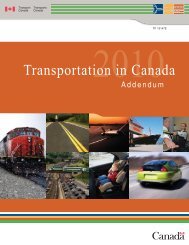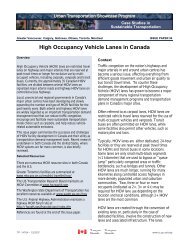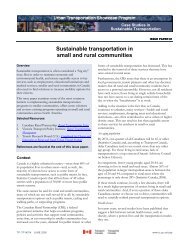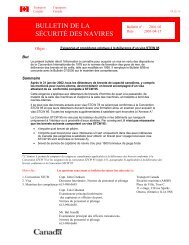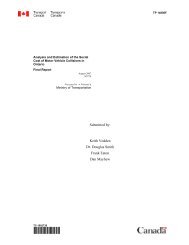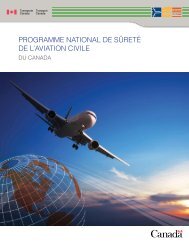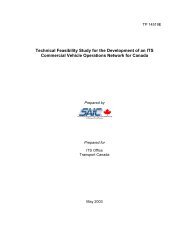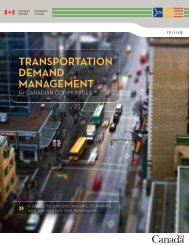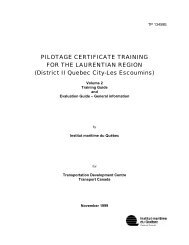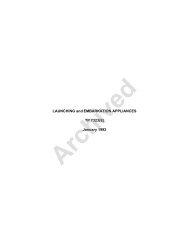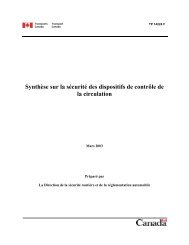Ontario Motor Coach Passenger Safety Consultation - Report -
Ontario Motor Coach Passenger Safety Consultation - Report -
Ontario Motor Coach Passenger Safety Consultation - Report -
You also want an ePaper? Increase the reach of your titles
YUMPU automatically turns print PDFs into web optimized ePapers that Google loves.
<strong>Ontario</strong> <strong>Motor</strong> <strong>Coach</strong><br />
<strong>Passenger</strong> <strong>Safety</strong> <strong>Consultation</strong><br />
- <strong>Report</strong> -<br />
Prepared by<br />
The Institute On Governance<br />
http://www.iog.ca<br />
June 1, 2000
Table of Contents<br />
___________________________________________________________<br />
I. Introduction 3<br />
II. Overview of <strong>Motor</strong> <strong>Coach</strong> Issues 4<br />
III. Seatbelts 5<br />
IV. Key <strong>Safety</strong> Issues 6<br />
i. Definition of a Bus 6<br />
ii. Drivers 6<br />
iii. Bus de-regulation and standards 8<br />
iv. <strong>Passenger</strong>s 9<br />
v. Bus Maintenance 9<br />
vi. Transport of Hazardous Materials 10<br />
vii. Bus Trailers 10<br />
Appendix A – Agenda 11<br />
Appendix B – List of Participants 13<br />
Appendix C – Participant’s Reactions 17<br />
<strong>Ontario</strong> <strong>Motor</strong> <strong>Coach</strong> <strong>Passenger</strong> <strong>Safety</strong> <strong>Consultation</strong> <strong>Report</strong> 2<br />
Institute On Governance
I. Introduction<br />
In June 1999, Transport Canada, with the assistance of the Institute On Governance, held a<br />
pilot session in Victoria, B.C. to discuss the issue of bus safety and identify possible actions<br />
which might further improve Canada’s strong safety record. PricewaterhouseCoopers was<br />
contracted by Transport Canada, in conjunction with the Institute on Governance, to assist<br />
with Bus <strong>Safety</strong> <strong>Consultation</strong>s across Canada.<br />
Since the pilot session in Victoria, consultations have been held in Moncton, New Brunswick<br />
(February 29 th , 2000), Lloydminster, Saskatchewan (March 7 th , 2000) and Winnipeg,<br />
Manitoba (March 14 th , 2000). Each session looked at safety issues related to school buses<br />
and motor coaches. Due to the large number of stakeholders in <strong>Ontario</strong>, it was decided two<br />
consultations would be held to deal with school buses and motor coaches separately. The<br />
first session on School Bus <strong>Passenger</strong> <strong>Safety</strong> took place on May 11, 2000 and was facilitated<br />
by PriceWaterhouseCoopers.<br />
The <strong>Motor</strong> <strong>Coach</strong> <strong>Passenger</strong> <strong>Safety</strong> consultation took place on May 12 th , 2000 at the Royal<br />
York Hotel, Toronto, <strong>Ontario</strong>. The session was organized by Transport Canada, the <strong>Ontario</strong><br />
Ministry of Transportation and the Institute On Governance, and facilitated by Ms. Claire<br />
Marshall and Mr. Phillip Haid of the Institute On Governance. The session involved a wide<br />
range of stakeholders including bus manufacturers and operators, public safety and<br />
standards organizations, association representatives (transport, motor coach, police and<br />
retired persons), transport unions and representatives from the federal and provincial<br />
governments.<br />
The session began with some opening remarks and a brief overview of the agenda and<br />
objectives for the consultation. The facilitators explained that the workshop was designed to<br />
obtain input and feedback from the participants to better understand:<br />
• their concerns regarding motor coach safety;<br />
• their views on installing seatbelts in motor coaches;<br />
• their suggestions on how to prioritize these concerns; and<br />
• their opinions regarding possible strategies to address these concerns.<br />
Ms. Linda Haldenby, Manager of the Road <strong>Safety</strong> Program Office at the Ministry of<br />
Transportation and Mr. Derek Sweet, Director of Road <strong>Safety</strong> at Transport Canada,<br />
welcomed participants and thanked them for attending the consultation. The facilitators then<br />
proceeded with an icebreaker exercise where participants were matched in pairs and given<br />
five minutes to get to know one another before presenting each other to the group.<br />
The session officially began with a presentation by Mr. Sweet, who outlined the context in<br />
which the consultation is taking place. Reference was made to the information packages,<br />
Canada’s exemplary record on bus safety, the desire to touch base with the public and the<br />
special effort made at reaching out to a wide range of stakeholders. Mr. Sweet elaborated on<br />
the need to discuss the issue of seat belts given that Transport Canada receives a great deal<br />
of correspondence requesting either the installation of seat belts on motor coaches or an<br />
explanation of their absence, especially after a bus crash. These questions raised by the<br />
general public, made this item mandatory for discussion.<br />
Mr. Sweet noted that following each consultation participants would receive, electronically or<br />
by mail, a copy of the report. It was also mentioned that a consolidated report would be<br />
<strong>Ontario</strong> <strong>Motor</strong> <strong>Coach</strong> <strong>Passenger</strong> <strong>Safety</strong> <strong>Consultation</strong> <strong>Report</strong> 3<br />
Institute On Governance
produced in the summer. Participants and other interested parties were invited to review the<br />
consultation outcomes on the web site at http://www.policity.com/worksites_transport.htm.<br />
Mr. Phillip Haid from the Institute on Governance elaborated on the web site and provided<br />
participants with a document explaining it.<br />
The intent of this Summary <strong>Report</strong> is to present the views and ideas expressed by the<br />
participants at the workshop. The <strong>Report</strong> endeavors to capture the discussion as accurately<br />
as possible, without offering any conclusions. The Final <strong>Report</strong> will cull all the ideas and<br />
suggestions provided in the sessions and on the web site, and offer some overall analysis<br />
and conclusions on bus safety.<br />
II.<br />
Overview of <strong>Motor</strong> <strong>Coach</strong> Issues<br />
In order to ensure all relevant <strong>Motor</strong> <strong>Coach</strong> <strong>Passenger</strong> Protection issues were covered during<br />
the consultation, participants were asked to share with the group (initially in triads and then<br />
in plenary) issues they would like to discuss. The main issues raised were as follows:<br />
• Definition of a bus<br />
• Drivers – training, licensing, hours of service, speed and behaviour, drug testing, driver<br />
injury (baggage), recruitment and retention<br />
• Bus de-regulation and safety standards<br />
• <strong>Passenger</strong>s – special needs, behaviour (alcohol), standees<br />
• Bus maintenance – standards and enforcement, awareness<br />
• Transport of hazardous materials (enforcement)<br />
• Bus Trailers<br />
This list served as the basis for the entire afternoon’s discussion. However, before entering<br />
into a discussion of these various issues, participants began by looking at the question of<br />
seatbelts in motor coaches.<br />
<strong>Ontario</strong> <strong>Motor</strong> <strong>Coach</strong> <strong>Passenger</strong> <strong>Safety</strong> <strong>Consultation</strong> <strong>Report</strong> 4<br />
Institute On Governance
III.<br />
Seatbelts in <strong>Motor</strong> <strong>Coach</strong>es<br />
The issue of whether to install seatbelts in motor coaches is a major pre-occupation of<br />
Transport Canada. This is primarily due to the public’s general perception that seatbelts<br />
would increase motor coach safety. During the workshop several seatbelt related issues were<br />
raised including, whether seatbelts should be placed in motor coaches and if so what type of<br />
belt would be most appropriate, crash testing, enforcement and liability, perception of a<br />
belted driver versus and unbelted passenger, and compartmentalization.<br />
General consensus among participants was that two-point seatbelts were not necessary in<br />
motor coaches. Several people pointed to the strong safety record and low fatality rate as<br />
evidence that a problem does not really exist. Some participants felt the low fatality statistics<br />
indicate that the emphasis in resources should go to other issues like the design and seating<br />
of buses. While the data is unavailable as it relates to three-point belts, some stakeholders<br />
argued that crash testing to test the viability of three point belts would be inconclusive. A<br />
few industry participants argued that while crash testing has not been done, it is not<br />
required because it would prove inconclusive and expensive. The general feeling was that<br />
the industry does a good job investigating real crashes and that the current lessons do not<br />
point to the need for seatbelts in motor coaches.<br />
Another related seatbelt safety issue was the question of compartmentalization. While motor<br />
coaches do not have the same type of regulated compartmentalization as school buses,<br />
stakeholders pointed out that motor coaches are designed to keep passengers in a bus in the<br />
event of a crash. Concern, however, was raised for those seated in the front seats where<br />
there is nothing stopping them from being ejected out of the bus. Some participants felt this<br />
was further exacerbated by the fact that drivers do wear belts while those in the front do<br />
not, and that passengers make the occasional request for installation. Questions were thus<br />
raised as to whether seatbelts might be appropriate for those seated in the front. It should<br />
be noted however, that no conclusions were drawn.<br />
The related issue of windows was also raised due to the potential risk associated with<br />
passenger ejection. Some felt the move towards larger windows is a bigger problem than<br />
seatbelts because in the event of a crash, windows can separate from the bus under impact,<br />
reducing protection to passengers.<br />
The discussion concluded with a general consensus that the largest problem facing the issue<br />
of seatbelts in motor coaches was one of public perception. The general feeling was that the<br />
strong safety record had not been communicated well enough and that what was needed<br />
was some solid documentation from Transport Canada outlining fatality rates, number of<br />
passengers carried on a bus every year and the general safety levels. Public education was<br />
thus seen as key to any strategy dealing with seatbelts in particular and safety more<br />
generally. However, it should be noted that participants felt safety was not a top concern for<br />
paying bus users, citing greater interest in having movies and music on board.<br />
In conclusion, the question of seatbelts in motor coaches was not a high priority issue for the<br />
stakeholder participants. They also believe it is not much of an issue for other groups<br />
associated with the bus industry, or the general paying public.<br />
<strong>Ontario</strong> <strong>Motor</strong> <strong>Coach</strong> <strong>Passenger</strong> <strong>Safety</strong> <strong>Consultation</strong> <strong>Report</strong> 5<br />
Institute On Governance
IV.<br />
Key <strong>Safety</strong> Issues<br />
There were a number of key safety issues raised during the consultation. Each issue is dealt<br />
with in this section, by describing the issue, general flavour of the discussion and possible<br />
action(s).<br />
i. Definition of a Bus<br />
The current definition of a bus involves ten or more passengers being transported.<br />
Issues:<br />
1. Current definition excludes smaller vehicles – the definition commonly used does not<br />
include smaller vehicles that are being used as ‘normal’ buses. As a result, such buses fall<br />
outside of safety regulations.<br />
2. A range of definitions exist between the US and Canada – this adds to the confusion,<br />
especially as the U.S. looks to move towards an eight passenger definition.<br />
3. Sub-classification – it is necessary to have a clear definition of a bus (including types of<br />
buses) in order to classify and sub-classify them when documenting accidents, safety<br />
reports and standards.<br />
Comments: Discussion revolved around the number of seats and whether service was<br />
commercial, i.e. compensated. The group believed a bus should be any vehicle that carries<br />
passengers on a regular basis and for compensation. There was no agreement on the<br />
number of seats. Participants also discussed the proliferation of smaller vehicles being used<br />
for commercial purposes and the general safety problem this causes.<br />
Possible Action:<br />
Workshop participants identified the need for federal and provincial governments (with the<br />
help of the Canadian Standards Association - who is currently working on such standards)<br />
to develop a clear definition (including smaller vehicles and design issues) and the adoption<br />
of a national standard.<br />
ii. Drivers<br />
There are a number of issues associated with drivers, including training, hours of service,<br />
licensing, drug testing and speed and behaviour.<br />
Training<br />
Issue: Some drivers are inadequately trained and cannot respond to passengers or incidents<br />
as they occur.<br />
Comments: Participants felt some operators offer training courses to newly hired drivers.<br />
Even fewer, they argued, offer refresher courses during employment. A driver simply has to<br />
present a license and he/she becomes a motor coach driver. Some participants felt the lack<br />
of training was a direct result of driver training being unregulated. Many stated the driver<br />
training problem is exacerbated by high turn over rates, since operators may not feel it<br />
worthwhile to invest in training if their employees are constantly leaving. Participants also<br />
stated that skills in safe driving habits, passenger management and first aid courses should<br />
be introduced.<br />
<strong>Ontario</strong> <strong>Motor</strong> <strong>Coach</strong> <strong>Passenger</strong> <strong>Safety</strong> <strong>Consultation</strong> <strong>Report</strong> 6<br />
Institute On Governance
Possible Actions: Joint initiative by governments, operators, and unions (or drivers) to:<br />
• Program the engine not to go above a set speed;<br />
• Introduce mandatory and regular testing (not just written testing) during employment;<br />
• Offers skills upgrading: safety, new technology, etc.;<br />
• Make first aid and CPR and passenger management skills (communication skills) a<br />
mandatory pre-employment requirement; and<br />
• Educate the public about the role of drivers.<br />
Hours of service<br />
Issues:<br />
1. Occasional cheating on log books<br />
2. Confusion as to what is a working day – question of being “on duty” versus “off duty”<br />
3. Inconsistency between US and Canadian practice<br />
4. Customer service versus hours of service<br />
5. Confusion in Canada between buses and trucks.<br />
Comments: Participants stated that a bus is not a truck and therefore the two vehicles<br />
should be kept separate in regulations concerning driver hours of service. A truck driver is<br />
on the highway for long hours with a single destination. A bus drives to several destinations<br />
in a day. Down time at a tourist site, though not active driving, still contributes to hours on<br />
duty and thus contributes to fatigue. Customers may also request drivers to go the “extra<br />
mile” forcing the driver to choose between customer service and pushing the boundaries<br />
surrounding their hours of service. The group felt this was one of the most complicated<br />
issues under discussion.<br />
Possible Actions:<br />
• Public consultation on forthcoming Transport Canada report due late summer 2000<br />
• Drafting rest rules (Operators and Unions)<br />
• Introducing electronic monitoring of hours to reduce log book cheating<br />
Licensing<br />
Issue: In <strong>Ontario</strong>, a truck driver can obtain a general bus driver license (not school bus) by<br />
passing a written test only, and is not required to be road tested in a bus.<br />
Comment: The problem this posed for many participants is that drivers do not need any prior<br />
specific motor coach experience in order to get a motor coach license. One of the major<br />
problems according to participants is the lack of consistency across the country.<br />
Possible Action – A task force at the Canadian Council of <strong>Motor</strong> Transport Administrators<br />
(CCMTA) is looking into the issue and participants felt nothing more should be done until the<br />
results of the task force are made public.<br />
Speed and behaviour<br />
Issues:<br />
1. Driver Training<br />
2. Police enforcement<br />
3. Public attitudes (more concerned with getting to destination on time than safety)<br />
Comment: Participants felt the main responsibility for this issue lies with bus driver and<br />
operators. However, they did feel that public attitudes play a role in the speed buses travel,<br />
as paying passengers tend to be unforgiving when buses do not make their estimated time<br />
<strong>Ontario</strong> <strong>Motor</strong> <strong>Coach</strong> <strong>Passenger</strong> <strong>Safety</strong> <strong>Consultation</strong> <strong>Report</strong> 7<br />
Institute On Governance
of arrival.<br />
Possible Action: Greater enforcement by drivers, operators and police, combined with a<br />
public education campaign to increase support for speed limits.<br />
Drug Testing<br />
Issues:<br />
1. Mandatory for cross border but not in Canada making the application inconsistent<br />
2. Drug testing is not public, shared information – protecting the driver and potentially<br />
harming the operator and public.<br />
Comment: Participants felt that the lack of drug testing in Canada was a safety concern as<br />
some drivers may work while under the influence of alcohol and/or narcotics. Some felt that<br />
the only way to ensure drivers do not use drugs while driving a bus was to conduct preemployment<br />
testing as well as periodic drug tests.<br />
Possible Action: Drug testing in Canada (there was no consensus on this issue – some even<br />
oppose it - however, a few participants did mention it as a possible course of action.<br />
iii. Bus de-regulation and standards<br />
Issue: <strong>Safety</strong> may be compromised if motor coaches operate in a free market economy<br />
because of competition and the desire to cut costs (through reduced maintenance schedules,<br />
older equipment, etc.)<br />
Comment: The group felt this had happened with planes and trucks as operators seek to<br />
shave corners to reduce prices and attract market share.<br />
Possible Actions:<br />
• Introduce a tight regulatory regime on safety requirements<br />
• Introduce oversight mechanism<br />
• Learn from parallel experiences in airline and trucking industries<br />
** De-regulation is currently being studied by the Federal Standing Committee on Transport<br />
Issue: Inconsistent standards & regulations<br />
Comment: Participants viewed this as a current problem for inter-provincial and<br />
international travel. Multiple permits are required for cross border traffic and the different<br />
rules create confusion for operators and drivers alike.<br />
Possible Action: Clear leadership required by the Federal Government.<br />
<strong>Ontario</strong> <strong>Motor</strong> <strong>Coach</strong> <strong>Passenger</strong> <strong>Safety</strong> <strong>Consultation</strong> <strong>Report</strong> 8<br />
Institute On Governance
iv. <strong>Passenger</strong>s<br />
There are several passenger issues including standees, access and behaviour.<br />
Standees<br />
Issue: Currently, motor coaches can carry as standees 1/3 of passenger seats in the bus<br />
(i.e. a bus with 60 seats can carry an additional 20 passengers standing).<br />
Possible Action: The group felt strongly that this was not safe and recommended eliminating<br />
standees completely. The only exception was in case of ‘need’. For example, in a case<br />
where not accepting a passenger as a standee would leave them beside the road in difficult<br />
conditions (winter, desolate spot, etc.) The group did recognize the difficulties of this<br />
position, citing the potential of buses leaving the terminal half empty in anticipation of<br />
passengers at rural stops, etc. They also noted the political difficulty in selling the<br />
elimination of standees. Participants were, however, united in the view that standees are a<br />
major safety concern.<br />
Access<br />
Issue: Some elderly people have difficulty boarding and maneuvering around motor coaches.<br />
Comment: The group believed that equipment and other solutions to the accessibility<br />
difficulties of the elderly and other special needs groups was available. They noted motor<br />
coaches observe a voluntary code in Canada, although ease of access is mandatory in the US.<br />
Possible Action: Participants felt demand would take care of the problem, especially as the<br />
population ages.<br />
Behaviour<br />
Issue: Inappropriate behaviour related to alcohol consumption.<br />
Comment: The group discussed how alcohol consumption on buses is illegal, yet people<br />
continue to drink, and some companies encourage it by loading on alcoholic beverages. The<br />
problem is further exacerbated by certain carriers being provided with alcohol permits as a<br />
reward for excellent carrier service. Participants believed few people realize that the coach<br />
driver could be charged if passengers are found drinking on board.<br />
Possible Action: Increased driver training around passenger management. Operators should<br />
bring their stated and unstated policies into compliance with the law. The public should be<br />
made more aware of illegality and possible charges for drinking on board.<br />
v. Bus Maintenance<br />
Issue: Enforcement - national standards need to be enforced consistently across the country<br />
Comment: Participants discussed how enforcement and the consistent application of<br />
enforcement are an ongoing problem faced by all jurisdictions. Most stakeholders agreed,<br />
however, that the new national safety rating (rating based on performance) enforced by the<br />
provinces is a step in the right direction.<br />
Possible Action: Provincial adherence to the new safety rating.<br />
<strong>Ontario</strong> <strong>Motor</strong> <strong>Coach</strong> <strong>Passenger</strong> <strong>Safety</strong> <strong>Consultation</strong> <strong>Report</strong> 9<br />
Institute On Governance
vi. Transport of Hazardous Materials<br />
Issue: Regulation and better driver awareness of what they are carrying.<br />
Comment: Participants did not feel this was a high priority issue, but did recognize the<br />
danger associated with transporting hazardous materials.<br />
Possible Action: Stricter provincial regulations.<br />
vii. Bus Trailers<br />
Issue: Trailers detaching from motor coaches.<br />
Comment: Participants did not feel this to be a high priority issue. They did feel however that<br />
permits should be enforced (they are presently required in <strong>Ontario</strong> only for “for hire” buses<br />
regulated by the <strong>Ontario</strong> Public Vehicles Act).<br />
Possible Action: The creation of a uniform application of rules requiring permits for all bus<br />
trailers.<br />
<strong>Ontario</strong> <strong>Motor</strong> <strong>Coach</strong> <strong>Passenger</strong> <strong>Safety</strong> <strong>Consultation</strong> <strong>Report</strong> 10<br />
Institute On Governance
________________________<br />
Appendix A<br />
Agenda<br />
________________________<br />
<strong>Ontario</strong> <strong>Motor</strong> <strong>Coach</strong> <strong>Passenger</strong> <strong>Safety</strong> <strong>Consultation</strong> <strong>Report</strong> 11<br />
Institute On Governance
<strong>Ontario</strong> <strong>Motor</strong> <strong>Coach</strong> <strong>Passenger</strong> <strong>Safety</strong> <strong>Consultation</strong><br />
Workshop Agenda<br />
Toronto, <strong>Ontario</strong>, May 12, 2000<br />
The purpose of the consultation session is to capture the views of the participants on<br />
the issue of motor coach passenger safety. More precisely, we seek to understand:<br />
• Your concerns regarding motor coach safety;<br />
• Your views on putting seatbelts in motor coaches;<br />
• Your suggestions on how to prioritize these concerns; and<br />
• Your opinions regarding possible strategies to address these concerns.<br />
9:00 – 9:30 Coffee<br />
9:30 – 10:00 Introduction<br />
opening remarks, workshop objectives, participants’<br />
expectations, ice- breaker<br />
10:00 – 10:15 Presentations<br />
Transport Canada – overview & context<br />
IOG – electronic consultation (e-Bus)<br />
10:15 – 11:00 Overview Discussion: <strong>Safety</strong> Issues & Concerns<br />
overview discussion on motor coach safety issues<br />
identification of areas of concern<br />
11:00 – 11:15 Health Break<br />
11:15 – 12:00 Discussion: Seatbelts in <strong>Motor</strong> <strong>Coach</strong>es<br />
exploration of the pros and cons<br />
possible initiatives to address the issue<br />
12:00 – 12:30 Lunch<br />
lunch will be provided in the meeting room<br />
12:30 – 2:15 Overview Discussion: Prioritization & Possible Initiatives<br />
prioritization of areas of concern identified in the a.m.<br />
potential initiatives to address these concerns<br />
2:15 – 2:30 Wrap-up<br />
review of overall discussions<br />
evaluation<br />
2:30 End of Session<br />
<strong>Ontario</strong> <strong>Motor</strong> <strong>Coach</strong> <strong>Passenger</strong> <strong>Safety</strong> <strong>Consultation</strong> <strong>Report</strong> 12<br />
Institute On Governance
________________________<br />
Appendix B<br />
List of Participants<br />
________________________<br />
<strong>Ontario</strong> <strong>Motor</strong> <strong>Coach</strong> <strong>Passenger</strong> <strong>Safety</strong> <strong>Consultation</strong> <strong>Report</strong> 13<br />
Institute On Governance
<strong>Ontario</strong> <strong>Motor</strong> <strong>Coach</strong><br />
<strong>Passenger</strong> <strong>Safety</strong> <strong>Consultation</strong><br />
May 12, 2000<br />
Carlo Bevilacqua<br />
<strong>Ontario</strong> Legislative Board<br />
United Transportation Union<br />
530 Cartier Street<br />
North bay, ON P1B 8N5<br />
David Carroll<br />
<strong>Ontario</strong> <strong>Motor</strong> <strong>Coach</strong> Association<br />
4141 Younge Street, Suite 306<br />
Toronto, ON M2P 2A8<br />
Dan Davis<br />
Transport Canada<br />
Place de Ville, Tower C, 8 th Floor<br />
330 Sparks Street<br />
Ottawa, <strong>Ontario</strong><br />
Bob Evans<br />
Canadian Urban Transport Association<br />
55 York Street<br />
Toronto, ON M5J 1R7<br />
Bill Gardner<br />
Transport Canada<br />
Place de Ville, Tower C, 8 th Floor<br />
330 Sparks Street<br />
Ottawa, <strong>Ontario</strong><br />
Phillip Haid<br />
Program Manager<br />
Institute on Governance<br />
122 Clarence Street<br />
Ottawa, ON K1N 5P6<br />
Linda Haldenby<br />
Manager of Road <strong>Safety</strong> Program Office<br />
Ministry of Transportation, Road User <strong>Safety</strong><br />
1201 Wilson Ave Bldg A, Rm 212<br />
Toronto ON M3M 1J8<br />
<strong>Ontario</strong> <strong>Motor</strong> <strong>Coach</strong> <strong>Passenger</strong> <strong>Safety</strong> <strong>Consultation</strong> <strong>Report</strong> 14<br />
Institute On Governance
Sergeant Gordon Jones<br />
Toronto Police Service -<br />
Traffic Services Collision Reconstruction Office<br />
<strong>Ontario</strong> Association of Chiefs of Police<br />
Traffic Services, 45<br />
Strachen Avenue<br />
Toronto, ON M6K 1W7<br />
Glenn J. King<br />
<strong>Ontario</strong> Legislative Board<br />
United Transportation Union<br />
530 Cartier Street<br />
North bay, ON P1B 8N5<br />
Paul Levine<br />
Canadian Standards Association International<br />
178 Rexdale Boulevard<br />
Toronto, ON M9W 1R3<br />
Claire Marshall<br />
Director<br />
Institute on Governance<br />
122 Clarence St.<br />
Ottawa, ON K1N 5P6<br />
John McGowan<br />
Canadian Association of Retired Persons<br />
11 Shenley Road<br />
Toronto, ON M1K 3V5<br />
Wendy McLandress<br />
Transportation Policy Branch<br />
Ministry of Transportation<br />
2 nd Floor, West Tower<br />
1201 Wilson Ave.<br />
Downsview, ON M3M 1J8<br />
Bill Mocsan<br />
Manager, Carrier <strong>Safety</strong> & Enforcement Branch<br />
Ministry of Transportation<br />
301 St. Paul Street<br />
St. Catharines ON L2R 7R4<br />
Paul Murphy<br />
<strong>Motor</strong> <strong>Coach</strong> Industries Limited (MCI Canada)<br />
1149 St. Matthews Ave.<br />
Winnipeg, MB R3G 0J8<br />
<strong>Ontario</strong> <strong>Motor</strong> <strong>Coach</strong> <strong>Passenger</strong> <strong>Safety</strong> <strong>Consultation</strong> <strong>Report</strong> 15<br />
Institute On Governance
Glenda Prudom<br />
Carrier <strong>Safety</strong> & Enforcement Branch<br />
Ministry of Transportation<br />
301 St. Paul Street<br />
St. Catharines ON L2R 7R4<br />
Kathy Soundy<br />
Director of Driver Development and <strong>Safety</strong><br />
Organization: Laidlaw Education Services<br />
3221 North Service Road<br />
Burlington ON L7R 3Y8<br />
Derek Sweet<br />
Director, Road <strong>Safety</strong><br />
Transport Canada<br />
Place de Ville, Tower C, 8 th Floor<br />
330 Sparks Street<br />
Ottawa, <strong>Ontario</strong><br />
David Ward<br />
<strong>Safety</strong> Policy Officer, Road <strong>Safety</strong> Program<br />
Ministry of Transportation, Road User <strong>Safety</strong><br />
1201 Wilson Ave<br />
Downsview ON M3M 3G8<br />
Valerie Willians<br />
Operations Manager<br />
<strong>Ontario</strong> <strong>Safety</strong> League<br />
5045 Orbitor Dr<br />
Mississauga ON L4W 4Y4<br />
<strong>Ontario</strong> <strong>Motor</strong> <strong>Coach</strong> <strong>Passenger</strong> <strong>Safety</strong> <strong>Consultation</strong> <strong>Report</strong> 16<br />
Institute On Governance
_______________________________<br />
Appendix C<br />
Participant’s Reactions<br />
_______________________________<br />
<strong>Ontario</strong> <strong>Motor</strong> <strong>Coach</strong> <strong>Passenger</strong> <strong>Safety</strong> <strong>Consultation</strong> <strong>Report</strong> 17<br />
Institute On Governance
Participant’s Reactions to the <strong>Consultation</strong><br />
This section presents a brief summary of the participants’ reactions to the workshop held in<br />
Toronto on May 12, 2000. The facilitators requested the participants list on a “recipe card”<br />
three things they liked about the workshop (or worked well) and three things they did not<br />
like (or would recommend be improved). This section presents a summary of the comments<br />
received.<br />
• Mix of stakeholders. Participants were generally very pleased with the selection of people<br />
who took part in the consultation. Most felt the stakeholders’ present had a strong<br />
knowledge of the issues. Almost all participants’ felt however, that operators were<br />
missing from the list and that their presence would have added to the discussion. It<br />
should be noted that several operators were invited but all but one declined the<br />
invitation.<br />
• Separating School Bus and <strong>Motor</strong> <strong>Coach</strong> Sessions. Overall, participants believed that<br />
separating the school bus and motor coach sessions was a very good idea. They felt that<br />
concentrating on each one separately provided a forum for more focused discussion.<br />
• Session format. Session participants were very pleased with the agenda, proportion of<br />
time allocated to the issues and the open and frank discussion that took place. Many<br />
cited they preferred a discussion based consultation to presentation-style format, and<br />
were pleased they had the opportunity to receive and share information, ideas and<br />
concerns with the group.<br />
• Facilitation. Overall participants were very pleased with the facilitation skills of the<br />
Institute On Governance. They felt the facilitators had a good grasp of the issues and<br />
were able to make relevant comments and linkages to ideas that were made throughout<br />
the day.<br />
• Discussion of Issues. Participants felt the issues discussed represented the key safety<br />
issues concerning motor coach passenger protection. They were pleased by the range of<br />
issues discussed and the information provided. One participant’s personal expectation<br />
was that the discussion would be more focused on direct safety issues and, therefore,<br />
was somewhat disappointed.<br />
• Facility. Session participants commented favourably on the facilities provided. They were<br />
pleased with lunch and liked the plenary and breakout room. One participant noted the<br />
downtown location proved difficult for those travelling from outside of the downtown<br />
core.<br />
• Web site. Several participants commented on the usefulness of the web site as a means<br />
to gain information, download reports and post comments.<br />
<strong>Ontario</strong> <strong>Motor</strong> <strong>Coach</strong> <strong>Passenger</strong> <strong>Safety</strong> <strong>Consultation</strong> <strong>Report</strong> 18<br />
Institute On Governance


